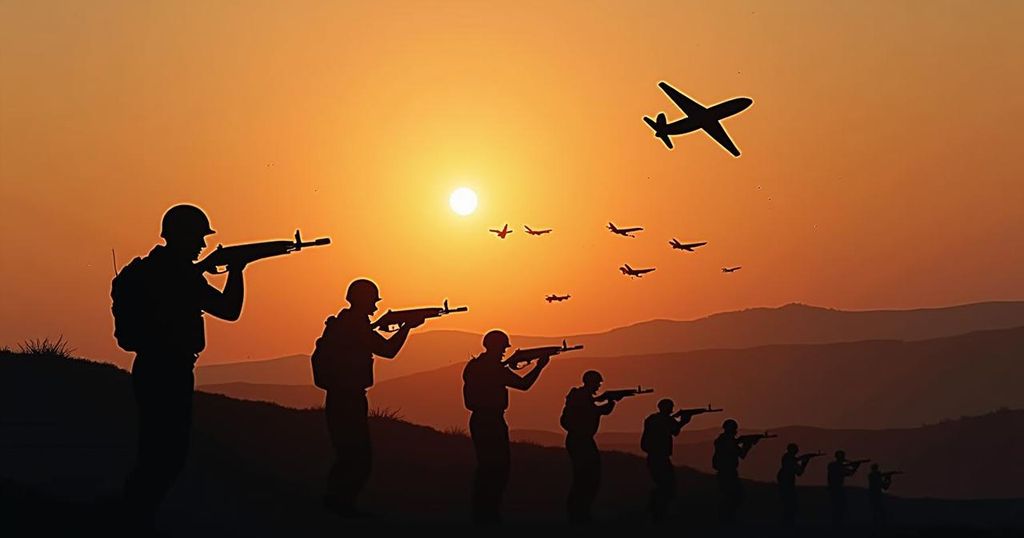Israeli airstrikes have killed several senior Hezbollah officials, including Nabil Kaouk, amidst the ongoing conflict following the death of Hassan Nasrallah. Concurrently, Israeli military operations targeted Houthi facilities in Yemen in retaliation for a missile attack on Israel. The situation has led to significant civilian casualties and displacement in Lebanon, raising concerns about escalating violence.
On Sunday, the Israeli military announced the successful targeting of another high-ranking official from Hezbollah. Nabil Kaouk, serving as the deputy head of Hezbollah’s Central Council, was confirmed dead following an airstrike in Lebanon, marking the seventh Hezbollah leader killed in a series of strikes within a week. This operation occurred amidst Hezbollah’s growing turmoil, particularly after the recent assassination of its overall leader, Hassan Nasrallah. The Israeli military disclosed that the targeted strike, which took place on Saturday, also involved casualties among 20 other Hezbollah militants and significant collateral damage in Beirut, where smoke continued to rise days after the attack. In addition, the Israeli military carried out extensive air operations against Houthi targets in Yemen following a Houthi ballistic missile assault on Israeli territory, specifically targeting Ben Gurion Airport. Through the strikes, the Israeli forces aimed at critical infrastructure, including power plants and sea ports, inflicting damage on facilities linked with the Iranian-supported Houthis, who proclaimed their preparedness against Israeli retaliation. Amid escalating tensions, U.S. national security spokesperson, John Kirby, commented on the grave impact of Israeli operations on Hezbollah, stating that Israel’s attacks have effectively dismantled much of the organization’s command structure. Nevertheless, he cautioned that Hezbollah would likely strive to reorganize swiftly. In Lebanon, the aftermath of these military actions has resulted in significant civilian casualties and widespread displacement, with estimates indicating that over a thousand lives have been lost in less than two weeks of conflict. Under the current circumstances, many families have been uprooted, seeking refuge in shelters or with relatives amid the ongoing hostilities. Hezbollah continues to retaliate with rocket fire directed at northern Israel, although the majority of the projectiles have been intercepted or have landed in uninhabited regions, thereby avoiding Israeli casualties since the initiation of targeted strikes on September 20. This cycle of violence perpetuates the perilous situation in the region, raising apprehensions about a broader conflict.
The recent Israeli airstrikes targeting Hezbollah in Lebanon stem from escalating tensions linked to the ongoing conflict between Israel and Houthi rebels in Yemen. These operations have intensified following provocative actions from both Hezbollah and the Houthis, who have aligned themselves in opposition to Israeli interests, supported financially and militarily by Iran. Hezbollah, a Lebanese militant group, has been pivotal in previous regional conflicts, particularly the war against Israel in 2006, and has since remained a significant adversary. The current uptick in hostilities marks a critical juncture in the longstanding strife between Israel and its adversaries, raising concerns regarding regional stability.
In conclusion, the Israeli military continues to engage in targeted strikes against Hezbollah leadership, notably following the death of key figures including the organization’s head, Hassan Nasrallah. Concurrently, airstrikes have expanded to target Houthi facilities in Yemen as retaliation for missile attacks against Israel. While these offensives have resulted in heavy casualties among Hezbollah ranks and contributed to widespread civilian displacement in Lebanon, the cycle of violence persists, with Hezbollah promising to continue its retaliation. The situation remains precarious with the potential for further escalation, underscoring the fragility of peace in the region.
Original Source: www.pbs.org





